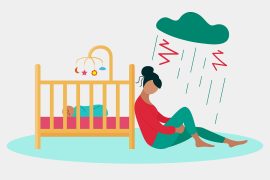Causes, Symptoms, and Management Tips
Pregnancy, a journey of transformation and growth, often brings with it a myriad of physiological changes. One of these shifts can be a drop in blood pressure. While high blood pressure is frequently discussed, many pregnant women experience the opposite – low blood pressure or hypotension. This article will shed light on this lesser-discussed phenomenon.
Definition and Overview
Low blood pressure during pregnancy, medically known as hypotension, is when the systolic blood pressure drops below 90 mm Hg, or the diastolic blood pressure goes below 60 mm Hg. It can feel significantly different compared to standard low blood pressure symptoms, especially considering the additional weight and blood volume during pregnancy.
Causes
- Body Changes: Pregnancy triggers multiple changes in a woman’s physiology.
- Blood Vessel Expansion: The body’s blood vessels expand, which can cause a drop in blood pressure.
- Hormonal Surge: A sudden increase in pregnancy hormones can contribute to decreased blood pressure.
- Pressure from the Uterus: As the uterus grows, it can press on large veins, hampering blood return to the heart and leading to lowered blood pressure.
Symptoms
While some pregnant women might not notice any symptoms, others may experience:
- Dizziness or feeling faint
- Fainting (a more severe form of dizziness)
- Shortness of breath
- Blurred vision
- Fatigue
- Nausea
Risks and Complications
- Reduced Blood Flow: Hypotension can limit the blood reaching the fetus, potentially causing complications.
- Fainting: A sudden drop in blood pressure may cause dizziness or fainting.
- Potential Falls: Fainting increases the risk of falls, which can be harmful for both the mother and the fetus.
Management Tips
- Dietary Changes: Adopt a regime of small, frequent meals throughout the day. This can prevent a sudden increase in blood flow to the stomach and thus prevent a sudden drop in blood pressure elsewhere.
- Stay Hydrated: Drink plenty of water to maintain blood volume.
- Postural Adjustments: Avoid standing up too quickly. When getting up, do so gradually to give your blood vessels time to adjust.
- Clothing: Wearing loose, comfortable clothing can increase blood flow, preventing any restrictions.
- Leg Movements: Flexing the ankles periodically can promote circulation, helping to counteract lowered pressure.
- Home Remedies: Some women find relief in natural remedies such as increased salt intake, but always consult a healthcare professional before making significant dietary changes.
When to Seek Medical Help
If symptoms of low blood pressure, especially fainting or dizziness, become frequent, it’s crucial to seek emergency care. Persistent symptoms can indicate an underlying issue that requires medical intervention.
- Frequent Symptoms: If you experience recurring symptoms like fainting or dizziness.
- Persistent Symptoms: If symptoms don’t subside and remain constant over a period.
- Unusual Symptoms: Any other symptoms that feel out of the ordinary or particularly concerning.
How to Seek Medical Help:
- Immediate Attention: For severe symptoms like fainting, call emergency services or have someone take you to the emergency room.
- Consult Your Obstetrician: Schedule an appointment to discuss your symptoms and get advice.
- Document Symptoms: Keep a record of when and how often you’re experiencing symptoms. This will help your doctor understand the situation better.
- Follow-up Appointments: Ensure you attend all scheduled prenatal check-ups.
- Ask Questions: During your visit, ask about preventive measures and treatments available.
- Stay Informed: Keep yourself informed about low blood pressure during pregnancy and its potential impacts.
- Stay Connected: Inform close family members or friends about your condition so they can assist if needed.
The Importance of Emotional Well-being During Pregnancy:
- Integral to Overall Health: Emotional well-being is as crucial as physical health during pregnancy.
- Stress Impact: Chronic stress can lead to physiological changes, potentially affecting blood pressure.
- Anxiety Concerns: High levels of anxiety can cause physical symptoms and may affect maternal and fetal health.
- Depression Link: Depression during pregnancy might lead to complications if untreated.
- Mind-Body Connection: Emotional disturbances can manifest physically, potentially complicating the pregnancy.
- Childbirth Preparation: A positive emotional state can help prepare for a smoother labor and postpartum experience.
- Bonding: Emotional well-being can influence maternal-infant bonding post-birth.
Prevention and Proactive Measures
Awareness and understanding are vital first steps, but prevention always holds the upper hand. Here are some preventative measures that pregnant women can adopt to manage the potential drop in blood pressure:
- Monitor Regularly: Regularly checking blood pressure ensures that any fluctuations are caught early. Invest in a good-quality home blood pressure monitor or make frequent visits to your healthcare provider.
- Elevate Your Feet: When sitting for extended periods, elevate your feet. This can help increase blood flow back to the heart and might mitigate the symptoms of low blood pressure.
- Avoid Long Periods of Standing: Standing for extended durations can exacerbate the symptoms of hypotension. If your job requires standing, ensure you take regular breaks to sit or walk a bit.
- Exercise Regularly: Gentle exercises, especially those tailored for pregnant women, can help maintain good circulatory health. Activities like prenatal yoga or swimming can be particularly beneficial.
- Stay Cool: Excessive heat can cause dilation of blood vessels, leading to a further drop in blood pressure. On hot days, ensure you stay in cool environments, use fans or air conditioning, and avoid direct sunlight.
- Limit Caffeine: While some caffeine is okay, excessive amounts can exacerbate blood pressure issues. It’s advisable to limit intake and always consult with a healthcare provider about what’s safe.

FAQs
Moderate drops are usually not harmful, but consistent, significantly low blood pressure might reduce the baby’s nutrient and oxygen supply.
Not necessarily. Each pregnancy is unique, and blood pressure can vary.
While some women vouch for increased salt intake or ginger tea, it’s essential to consult a healthcare professional before trying any home remedies.
Conclusion
While low blood pressure during pregnancy might be concerning, understanding its causes, symptoms, and remedies can make a significant difference. Stay informed, listen to your body, and always prioritize your well-being.






